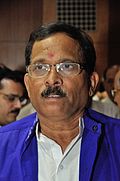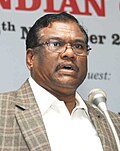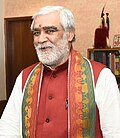| Portrait | Minister
(Birth-Death)
Constituency | Term of office | Political party | Ministry | Prime Minister |
|---|
| From | To | Period |
|---|
| Minister of Health |
|---|
| 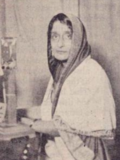 | Rajkumari Amrit Kaur DStJ
(1887–1964)
MP for Central Provinces and Berar, till 1952
MP for Mandi Mahasu, from 1952 | 15 August 1947 | 17 April 1957 | 9 years, 244 days | Indian National Congress | Nehru I | | Jawaharlal Nehru |
| Nehru II |
| 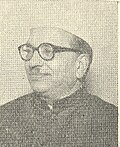 | D. P. Karmarkar
(1902–1991)
MP for Dharwad North
(Minister of State) | 17 April 1957 | 9 April 1962 | 4 years, 357 days | Nehru III |
|  | Sushila Nayyar
(1914–2001)
MP for Jhansi
(Minister of State) | 10 April 1962 | 24 January 1966 | 2 years, 145 days | Nehru IV |
| Nanda I | | Gulzarilal Nanda |
| Shastri | | Lal Bahadur Shastri |
| Nanda II | | Gulzarilal Nanda |
| Minister of Health and Family Planning |
|---|
|  | Sushila Nayyar
(1914–2001)
MP for Jhansi
(Minister of State) | 24 January 1966 | 13 March 1967 | 323 days | Indian National Congress | Indira I | | Indira Gandhi |
|  | Sripati Chandrasekhar
(1918–2001)
Rajya Sabha MP for Tamil Nadu
(Minister of State) | 13 March 1967 | 14 November 1967 | 246 days | Indira II |
|  | Satya Narayan Sinha
(1900–1983)
MP for Darbhanga | 14 November 1967 | 14 February 1969 | 1 year, 92 days |
|  | Kodardas Kalidas Shah
(1908–1986)
Rajya Sabha MP for Gujarat | 14 February 1969 | 19 May 1971 | 2 years, 94 days | Indian National Congress (R) |
|  | Uma Shankar Dikshit
(1901–1991)
Rajya Sabha MP for Uttar Pradesh | 19 May 1971 | 5 February 1973 | 1 year, 262 days | Indira III | |
| 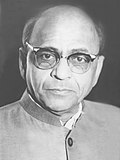 | Raghunath Keshav Khadilkar
(1905–1979)
MP for Khed
(Minister of State) | 5 February 1973 | 9 November 1973 | 277 days |
|  | Karan Singh
(born 1931)
MP for Udhampur | 9 November 1973 | 24 March 1977 | 3 years, 135 days |
| Minister of Health and Family Welfare |
|---|
|  | Raj Narain
(1917–1986)
MP for Allahabad | 28 March 1977 | 1 July 1978 | 1 year, 95 days | Janata Party | Desai | | Morarji Desai |
|  | Morarji Desai
(1896–1995)
MP for Surat
(Prime Minister) | 1 July 1978 | 24 January 1979 | 207 days |
|  | Rabi Ray
(1926–2017)
Rajya Sabha MP for Odisha | 25 January 1979 | 15 July 1979 | 171 days |
|  | Morarji Desai
(1896–1995)
MP for Surat
(Prime Minister) | 16 July 1979 | 28 July 1979 | 12 days |
|  | Rabi Ray
(1926–2017)
Rajya Sabha MP for Odisha | 28 July 1979 | 14 January 1980 | 170 days | Janata Party (Secular) | Charan Singh | | Charan Singh |
|  | B. Shankaranand
(1925–2009)
MP for Chikkodi | 16 January 1980 | 31 October 1984 | 4 years, 350 days | Indian National Congress | Indira IV | | Indira Gandhi |
| 4 November 1984 | 31 December 1984 | Rajiv I | | Rajiv Gandhi |
|  | Mohsina Kidwai
(born 1932)
MP for Meerut | 31 December 1984 | 24 June 1986 | 1 year, 175 days | Rajiv II |
| 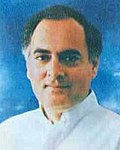 | Rajiv Gandhi
(1944–1991)
MP for Amethi
(Prime Minister) | 24 June 1986 | 14 February 1988 | 1 year, 235 days |
| 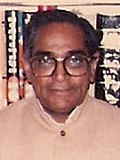 | Motilal Vora
(1928–2020)
Rajya Sabha MP for Madhya Pradesh | 14 February 1988 | 24 January 1989 | 345 days |
|  | Ram Niwas Mirdha
(1924–2010)
Rajya Sabha MP for Rajasthan
(Minister of State, I/C) | 24 January 1989 | 4 July 1989 | 161 days |
|  | Rafique Alam
(1929–2011)
Rajya Sabha MP for Bihar
(Minister of State, I/C) | 4 July 1989 | 2 December 1989 | 151 days |
|  | Nilamani Routray
(1920–2004)
MP for Puri | 6 December 1989 | 23 April 1990 | 138 days | Janata Dal | Vishwanath | | V. P. Singh |
| | Rasheed Masood
(1947–2020)
MP for Saharanpur
(Minister of State, I/C) | 23 April 1990 | 10 November 1990 | 201 days |
| | Shakeelur Rehman
(1931–2016)
MP for Darbhanga | 21 November 1990 | 20 February 1991 | 91 days | Samajwadi Janata Party (Rashtriya) | Chandra Shekhar | | Chandra Shekhar |
|  | Chandra Shekhar
(1927–2007)
MP for Ballia
(Prime Minister) | 20 February 1991 | 21 June 1991 | 121 days |
|  | Makhan Lal Fotedar
(1932–2017)
Rajya Sabha MP for Uttar Pradesh | 21 June 1991 | 17 January 1993 | 1 year, 210 days | Indian National Congress | Rao | | P. V. Narasimha Rao |
|  | B. Shankaranand
(1925–2009)
MP for Chikkodi | 18 January 1993 | 22 December 1994 | 1 year, 338 days |
| 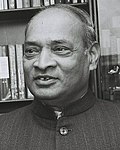 | P. V. Narasimha Rao
(1921–2004)
MP for Nandyal
(Prime Minister) | 23 December 1994 | 11 June 1995 | 170 days |
| 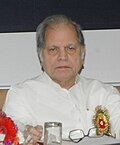 | A. R. Antulay
(1929–2014)
MP for Kolaba | 11 June 1995 | 16 May 1996 | 340 days |
| | Sartaj Singh
(born 1940)
MP for Narmadapuram | 16 May 1996 | 1 June 1996 | 16 days | Bharatiya Janata Party | Vajpayee I | | Atal Bihari Vajpayee |
|  | H. D. Deve Gowda
(born 1933)
Unelected
(Prime Minister) | 1 June 1996 | 29 June 1996 | 28 days | Janata Dal | Deve Gowda | | H. D. Deve Gowda |
| | Saleem Iqbal Shervani
(born 1953)
MP for Badaun
(Minister of State, I/C) | 29 June 1996 | 9 June 1997 | 345 days | Samajwadi Party |
| Gujral | | Inder Kumar Gujral |
|  | Inder Kumar Gujral
(1919–2012)
Rajya Sabha MP for Bihar
(Prime Minister) | 9 June 1997 | 19 March 1998 | 283 days | Janata Dal |
| | Dalit Ezhilmalai
(1945–2020)
MP for Chidambaram
(Minister of State, I/C) | 20 March 1998 | 14 August 1999 | 1 year, 0 days | Pattali Makkal Katchi | Vajpayee II | | Atal Bihari Vajpayee |
| 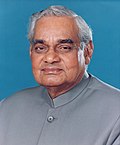 | Atal Bihari Vajpayee
(1924–2018)
MP for Lucknow
(Prime Minister) | 14 August 1999 | 16 August 1999 | 2 days | Bharatiya Janata Party |
| | A. K. Patel
(born 1931)
MP for Mehsena
(Minister of State, I/C) | 16 August 1999 | 13 October 1999 | 58 days |
| | N. T. Shanmugam
MP for Vellore
(Minister of State, I/C) | 13 October 1999 | 27 May 2000 | 227 days | Pattali Makkal Katchi | Vajpayee III |
| 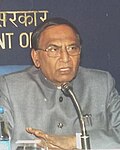 | C. P. Thakur
(born 1931)
MP for Patna | 27 May 2000 | 1 July 2002 | 2 years, 35 days | Bharatiya Janata Party |
|  | Shatrughan Sinha
(born 1946)
Rajya Sabha MP for Bihar | 1 July 2002 | 29 January 2003 | 212 days |
|  | Sushma Swaraj
(1952–2019)
Rajya Sabha MP for Uttarakhand | 29 January 2003 | 22 May 2004 | 1 year, 114 days |
|  | Anbumani Ramadoss
(born 1968)
Rajya Sabha MP for Tamil Nadu | 23 May 2004 | 29 March 2009 | 4 years, 310 days | Pattali Makkal Katchi | Manmohan I | | Manmohan Singh |
|  | Panabaka Lakshmi
(born 1958)
MP for Nellore
(Minister of State, I/C) | 29 March 2009 | 22 May 2009 | 54 days | Indian National Congress |
|  | Ghulam Nabi Azad
(born 1949)
Rajya Sabha MP for Jammu and Kashmir | 29 May 2009 | 26 May 2014 | 4 years, 362 days | Manmohan II |
|  | Harsh Vardhan
(born 1954)
MP for Chandni Chowk | 27 May 2014 | 9 November 2014 | 99 days | Bharatiya Janata Party | Modi I | | Narendra Modi |
|  | Jagat Prakash Nadda
(born 1960)
Rajya Sabha MP for Himachal Pradesh | 9 November 2014 | 30 May 2019 | 4 years, 202 days |
|  | Harsh Vardhan
(born 1954)
MP for Chandni Chowk | 31 May 2019 | 7 July 2021 | 2 years, 37 days | Modi II |
|  | Mansukh Mandaviya
(born 1972)
Rajya Sabha MP for Gujarat | 7 July 2021 | 9 June 2024 | 2 years, 338 days |
|  | Jagat Prakash Nadda
(born 1960)
Rajya Sabha MP for Himachal Pradesh | 10 June 2024 | Incumbent | 1 year, 205 days | Modi III |
|


















































